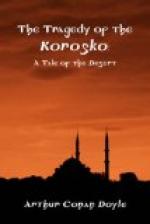“As to the learning of which you speak, my lamb,” said the Moolah, in answer to some argument of Fardet’s, “I have myself studied at the University of El Azhar at Cairo, and I know that to which you allude. But the learning of the faithful is not as the learning of the unbeliever, and it is not fitting that we pry too deeply into the ways of Allah. Some stars have tails, oh my sweet lamb, and some have not; but what does it profit us to know which are which? For God made them all, and they are very safe in His hands. Therefore, my friend, be not puffed up by the foolish learning of the West, and understand that there is only one wisdom, which consists in following the will of Allah as His chosen prophet has laid it down for us in this book. And now, my lambs, I see that you are ready to come into Islam, and it is time, for that bugle tells that we are about to march, and it was the order of the excellent Emir Abderrahman that your choice should be taken, one way or the other, before ever we left the wells.”
“Yet, my father, there are other points upon which I would gladly have instruction,” said the Frenchman, “for, indeed, it is a pleasure to hear your clear words after the cloudy accounts which we have had from other teachers.”
But the Moolah had risen, and a gleam of suspicion twinkled in his single eye.
“This further instruction may well come afterwards,” said he, “since we shall travel together as far as Khartoum, and it will be a joy to me to see you grow in wisdom and in virtue as we go.” He walked over to the fire, and stooping down, with the pompous slowness of a stout man, he returned with two half-charred sticks, which he laid cross-wise upon the ground. The Dervishes came clustering over to see the new converts admitted into the fold. They stood round in the dim light, tall and fantastic, with the high necks and supercilious heads of the camels swaying above them.
“Now,” said the Moolah, and his voice had lost its conciliatory and persuasive tone, “there is no more time for you. Here upon the ground I have made out of two sticks the foolish and superstitious symbol of your former creed. You will trample upon it, as a sign that you renounce it, and you will kiss the Koran, as a sign that you accept it, and what more you need in the way of instruction shall be given to you as you go.”
They stood up, the four men and the three women, to meet the crisis of their fate. None of them, except perhaps Miss Adams and Mrs. Belmont, had any deep religious convictions. All of them were children of this world, and some of them disagreed with everything which that symbol upon the earth represented. But there was the European pride, the pride of the white race which swelled within them, and held them to the faith of their countrymen. It was a sinful, human, un-Christian motive, and yet it was about to make them public martyrs to the Christian creed. In the hush and tension of their nerves low sounds grew suddenly loud upon their ears. Those swishing palm-leaves above them were like a swift-flowing river, and far away they could hear the dull, soft thudding of a galloping camel.




